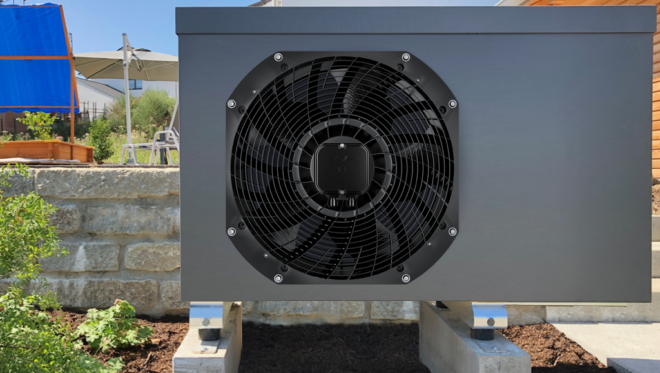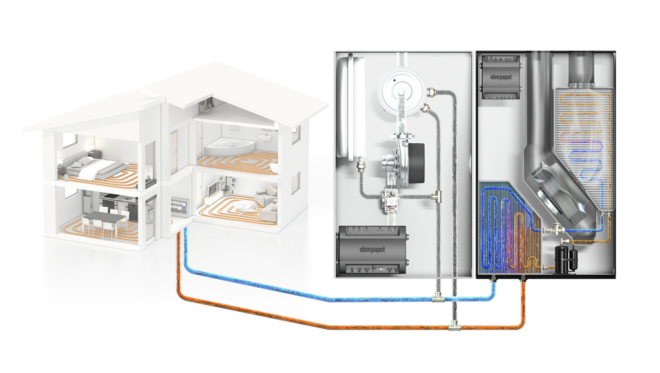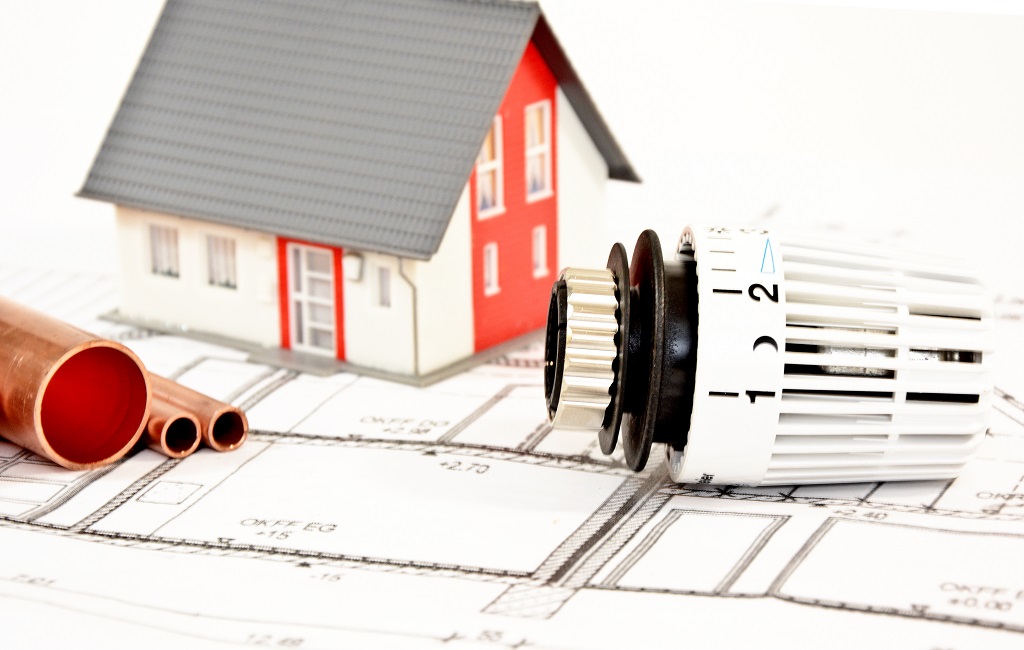The EU’s main objective: climate neutrality by 2050. The driving force behind this is renewable energy. And this is exactly where the big potential for heating is: around 40 % of total final energy in Germany is consumed in buildings; around 85 % of the energy is used for building heating and hot drinking water supply.
Millions of heating systems in Germany are more than 15 years old and their energy efficiency is far lower than the latest technology. But which systems should house builders or buyers turn to? We show which heating concepts are particularly environmentally friendly, how system components from ebm-papst support climate protection, and which funding program is worthwhile for which solution.
Efficient energy from the environment
Heat pumps are becoming increasingly popular for sustainable heat generation, as they mainly obtain their energy from their environment, i.e. from water, air, or earth. Ideally, power for operation can also be obtained from renewable energies using photovoltaic systems. In the future, this will also make heat pumps independent of increasing electricity prices and will cut operating costs. During operation, heat pumps absolutely have to be quiet, regardless of whether they are installed indoors or outdoors.
The new AxiEco series is therefore a perfect component for modern heat pumps, as the axial fans are well suited for applications in noise-sensitive areas due to their low noise emissions. They also work with optimum efficiency. The extra advantage is that there are many ways of using predictive maintenance for the fans thanks to GreenIntelligence.

The new AxiEco Perform EC axial fan from the AxiEco series in the air-to-water heat pump application example. It is well suited for applications in noise-sensitive areas due to its optimal flow and the resulting low noise emission. (Photo: ebm-papst)
Bridging the gap with gas condensing technology
In order to generate heat, modern gas condensing boilers not only use the gas itself, but also the latent heat of the water vapor contained in the exhaust gas due to the combustion process. This increases efficiency and also decreases the demand for fuel. This is currently the most important bridging technology in the energy revolution – simply by replacing old heating systems with gas condensing technology and achieving the associated CO2 reduction. It can also be easily combined with other heating concepts, for example with solar heating or a pellet stove. That makes it “renewable ready” – which means that it can be expanded with renewable energy sources later.

The CleanEco pneumatic combustion control system (top) and the CleanVario electronic combustion control system (bottom) offer a perfectly coordinated complete system consisting of boiler control unit (BCU), gas valve, venturi and gas blower. (Photo: ebm-papst)
Modern condensing boilers are controlled electronically and adapt the heating output very flexibly to the required heating load. The ebm-papst CleanEco (pneumatic) as well as CleanVario (electronic) combustion controls provide a perfectly coordinated gas/air ratio control system including combustion control. This means that the optimum, stable mixture of oxygen and fuel is always produced. Modulation levels of 1:10 are now possible, which contributes to increasing efficiency and ensures very environmentally friendly operation.

Whether by controlling the gas valve with the aid of a vacuum (CleanEco, see top illustration) or with the aid of electronic control of the gas valve (CleanVario, see this illustration), the optimum, stable mixture of oxygen and fuel is always created. (Photo: ebm-papst)
Hybrid systems: The best of both worlds
Hybrid systems consisting of a gas condensing unit and a heat pump are particularly useful if the gas power is required in booster mode (water heating) or at very low outside temperatures. The advantage to you is that the heat pump is responsible for the heating base load; if the outdoor temperatures drop significantly into the sub-zero range, the gas condensing boiler works as a booster to provide consistent heat.
In order to do without fossil fuels for as long as possible, the operators can individually control the point at which gas condensing technology takes over themselves and thus choose the cheapest operating mode – depending on the electricity and gas prices. This makes the hybrid system a future-proof solution, as it works independently of individual energy sources.
A higher-level control system provides the intelligence for consistently cozy heat – the 900H Series Control Platform from ebm-papst, which controls the output of the gas condensing unit and the heat pump in a targeted manner, depending on the situation, and coordinates the connection or sole operation of the condensing boiler during peaks. Here too, GreenIntelligence plays a role by ensuring predictive maintenance of the hybrid system.

The higher-level control system, the 900H Series Control Platform from ebm-papst, regulates the hybrid system’s output in a targeted manner depending on the situation and coordinates the additional ignition of the condensing boiler when temperatures are significantly below zero. (Photo: ebm-papst)
Don’t forget about funding
It’s worth taking a look at the funding opportunities before building a new building or refurbishing one: Germany has around six billion euros of funding available for 2021. This is available for both the construction or the initial purchase of residential buildings as a KfW Efficiency House (building that is promoted by the KfW promotional bank) and for individual measures for existing buildings (BAFA – German Federal Office for Economic Affairs and Export Control), as shown by the Federation of German Heating Industry. This includes heat pumps, “renewable ready” gas condensing technology, and hybrid systems.
KfW program – energy-efficient construction
| Requirements | Repayment bonus |
| KfW Efficiency House 55 | 15 % |
| KfW Efficiency House 40 | 20 % |
| KfW Efficiency House 40 Plus | 25 % |
KfW program – energy-efficient renovation
| Requirements | Repayment bonus | Investment grant |
| Individual measures | 20 % | – |
| KfW Efficiency House 115 | 25 % | 25% (max. 30,000 per residential unit) |
| KfW Efficiency House Monument | 25 % | 25% (max. 30,000 per residential unit) |
| KfW Efficiency House 100 | 27,5 % | 27.5 % (max. 33,000 per residential unit) |
| KfW Efficiency House 85 | 30 % | 30 % (max. 36,000 per residential unit) |
| KfW Efficiency House 70 | 35 % | 35 % (max. 42,000 per residential unit) |
| KfW Efficiency House 55 | 40 % | 40 % (max. 48,000 per residential unit) |
BEG EM – German federal funding for efficient buildings – individual measures
Would you like to implement individual measures in an existing building? The German Federal Office for Economic Affairs and Export Control (BAFA) will support your project in the form of non-repayable subsidies proportionate to the costs eligible for funding. This also includes the above-mentioned heat generation systems such as gas condensing boilers, which are “renewable ready”, gas hybrid systems, and heat pumps. The maximum for residential buildings is 60,000 euros per residential unit. Heat pumps receive the highest funding rate of 35 % to 45 %. Technical planning and building support can also be supported at 50 %.
| Individual measure | Funding rate | Funding rate with replacement of oil heating | Technical planning and building support |
| “Renewable ready” gas condensing boiler | 20 % | 20 % | 50 % |
| Gas hybrid system | 30 % | 40 % | 50 % |
| Heat pump | 35 % | 45 % | 50 % |
You can find more detailed information on the funding programs in the brochure from the Federation of German Heating Industry.

Leave a comment